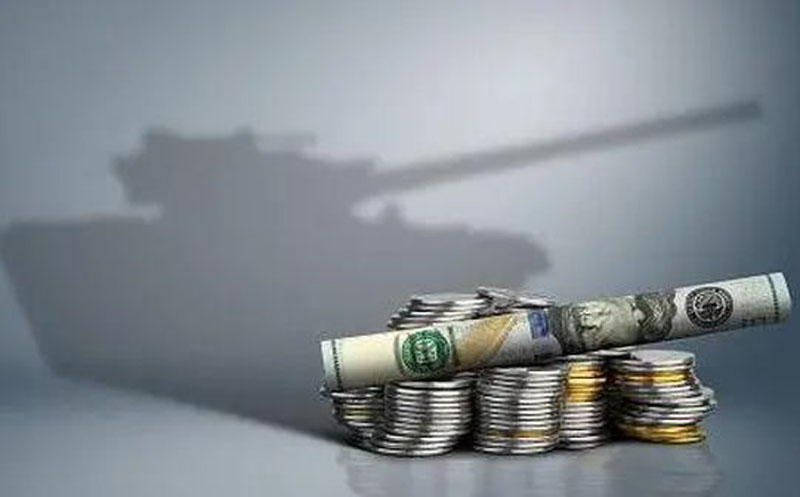Почему сейчас снова заговорили о дефолте и чем он может угрожать Украине


«У Украины есть месяц, чтобы избежать дефолта», — такой заголовок статьи в уважаемом британском бизнес-издании Economist вызвал новую волну панических обсуждений двух слов, которые являются страшными для украинцев — «дефолт» и «девальвация».
Действительно ли через месяц Украину ожидает дефолт? Что это будет означать? И упадет ли от него гривна? В ВВС Украина изучали тревожные тенденции.
Почему сейчас снова заговорили о дефолте
Два года назад, в августе 2022, кредиторы Украины согласились, чтобы ее долги реструктуризировали, в частности, заморозили и выплаты по еврооблигациям.
Как пишет британский Economist, если бы не реструктуризация, расходы на обслуживание долга были бы второй по размерам статьей расходов Украины — после обороны.
Но Украина получила лишь два года отсрочки, потому что в августе 2022 обе стороны — и Украина, и ее кредиторы — считали, что война не продлится долго, и что в 2024 Киев уже сможет вернуться к обслуживанию своих долгов.
«Тогда была идея, что война закончится, и через два года все станет ясно, сядем и передоговоримся. Но два года прошло, и ничего не ясно», — пояснил в интервью NV финансовый банкир Сергей Фурса.
Но, то, что война не завершится быстро, что Украина еще долго не сможет рассчитываться по своим долгам и нужна новая реструктуризация стало понятно уже в начале 2023 года, отмечает руководитель аналитического департамента Concorde Capital Александр Паращий.
МВФ даже включил это в новую программу сотрудничества с Украиной на 15 млрд долларов, утвержденную в марте 2023 года, а впоследствии стал активно лоббировать новую отсрочку для Украины.
«Украина намерений платить по тому графику, который был согласован два года назад, не имеет. МВФ позволяет не придерживаться этого графика, и МВФ благословил Украину на новые переговоры с кредиторами о новом графике платежей», — объясняет Паращий.
Эти переговоры, говорит финансовый аналитик, ведутся вокруг уменьшения ставки купона украинских еврооблигаций, переноса сроков погашения всех облигаций и частичного списания долга. В прошлую пятницу МВФ обнародовал обновленный меморандум после очередного пересмотра программы сотрудничества с Украиной. В нем, утверждает Паращий, фактически есть все параметры возможного соглашения с кредиторами: «сторонам надо сделать очень простые арифметические упражнения и проверить, соответствуют ли предложенные ими условия критериям устойчивости долга, как его видит МВФ в своих прогнозах».
При этом, как отмечает Сергей Фурса, МВФ сейчас является самым жестким участником переговоров, а Украина скорее находится под его «зонтиком».
«Патронаж» МВФ над соглашением с кредиторами важен, потому что фонд также занимается и общим пакетом финансовой помощи от международных партнеров Украины на более чем 100 млрд долларов.
«Эта сумма уже включала примерно 15 млрд уступок от частных кредиторов. Они сказали — мы вас благословляем, только пойдите и возьмите у них эти 15 млрд в виде отсрочек от платежей, которые вы должны делать, но, даст Бог, не сделаете», — объясняет Александр Паращий.
О каких долгах идет речь и почему не удается договориться
Суверенные кредиторы, то есть отдельные страны, под «патронатом» МВФ уже давно, еще в конце 2023 года, согласились на отсрочку для Украины. Но с частными кредиторами — преимущественно инвестиционными, а также пенсионными фондами, страховыми компаниями из Британии, США, Франции — переговоры продолжаются.
В июне Украина сделала свое предложение: уменьшить стоимость долга до 60%. Это означает, что с каждого инвестированного доллара инвесторы смогли бы получить теперь только 60 центов. Кредиторы ответили, что скидка в 20% была бы для них более приемлемой.
«Это как Путин говорит, что для мира вы должны отдать Запорожье, которое он даже не контролирует полностью», — говорит Фурса. Как на любых других переговорах стороны сначала объявляют максимальные позиции, а договариваются где-то посередине, считает финансовый эксперт.
Сумма долга не является заоблачно большой — всего чуть более 20 млрд долларов. Но учитывая тотальную нехватку средств, ее выплата для Украины не реалистична.
Все доходы, которые производит украинская экономика, сейчас идут на армию и безопасность. Финансовая помощь от международных партнеров — ЕС, США, других стран и международных организаций, как МВФ — идет на покрытие невоенных расходов украинского бюджета.
В начале этого года ЕС одобрил предоставление Украине помощи на 50 млрд евро, еще около 8 млрд долларов должно поступить от США (из общего пакета помощи в 61 млрд долларов, одобренного американским Конгрессом этой весной после длительного промедления). Но даже при этих обстоятельствах министр финансов Украины Сергей Марченко считает, что в следующем году в украинском бюджете не будет хватать около 12 млрд долларов.
В то же время для частных инвестиционных фондов, которые и являются владельцами украинских еврооблигаций, речь идет о меньшем проценте в инвестиционных портфелях, говорит Александр Паращий. Но есть люди, которые отвечают за эти инвестиции, и они не могут просто поставить на них крест, как на собственных бонусах.
«На уровне менеджеров они такого не могут сделать, — объясняет финансовый аналитик. — То есть есть менеджеры, которые ответственны за эту инвестицию, они советовали вложиться в эти бумаги, и их начальство теперь у них спрашивает, где деньги. Нужно выходить из ситуации, и они делают все возможное, чтобы получить максимум».
Будет ли дефолт и упадет ли гривна
Как пишет Economist в упомянутой статье, пока соглашения о реструктуризации нет, у Украины есть два варианта: продолжать переговоры, пока не удастся договориться, как договорились с суверенными кредиторами о заморозке долговых выплат до 2027 года, или дефолт.
«Это может звучать довольно резко, но на самом деле между этими двумя вариантами небольшая разница, — пишет Economist, — В обоих случаях украинских платежей не будет».
В мае, когда начались консультации с частными кредиторами, глава парламентского финансового комитета Даниил Гетманцев заявлял, что о дефолте речь не идет.
«Переговоры не будут легкой прогулкой — это факт, но не сомневаюсь, что они закончатся соглашением в ближайшие месяцы, — заявлял депутат в интервью Wall Street Journal, уверяя, что «ни о каком полноценном дефолте сейчас речь точно не идет». По словам Гетманцева, опции заключаются либо в продлении отсрочки, либо в полноценной реструктуризации с частичным обслуживанием и списанием долга.
«Нет никакого варианта с жестким дефолтом. Это не нужно Украине, это не нужно МВФ, это не нужно кредиторам, — никому это не нужно. Поэтому пугаться нечего», — утверждает Сергей Фурса.
В реальности стороны либо договорятся о новой реструктуризации, либо о новой заморозке выплат. То есть — договорятся договариваться договариваться.
По большому счету, Украина живет в дефолте с февраля 2022 года, потому что с тех пор «нам дают деньги только правительства и по политическим мотивам — частные кредиторы нам деньги не дают», считает Александр Паращий. Но, отмечает он, само слово дефолт «будет очень популярным и в июле, в августе».
Однако даже в случае настоящего дефолта, то есть формального признания неспособности платить по обязательствам, ситуация не будет какой-то экстраординарной для Украины. За последние 10 лет, с тех пор как Россия аннексировала Крым, это будет уже в третий раз.
Конечно, буква D в кредитном рейтинге не украшает страну, но, говорит Паращий, но «она у нас уже есть».
«Когда мы делали реструктуризацию 2022 года, рейтинговые агентства на несколько минут нам поставили эту букву. Когда мы делали реструктуризацию в 2015 году, было абсолютно то же самое», — говорит руководитель аналитического департамента Concorde Capital, добавляя, что размещение украинских еврооблигаций в 2017-2018 гг. показали, что это не сильно влияло на возможность Украины выходить на международные рынки капитала, когда такая возможность была.
В целом, считает финансовый аналитик, в Украине долгое время существует искаженное отношение к тому, что такое дефолт, и его безосновательно связывают с другим страшным словом на «Д» — девальвацией.
«Оно ассоциируется с финансовым кризисом, который начался в августе 1998 года в России. Этот кризис был спровоцирован непутевыми действиями российского правительства, непутевой монетарной, валютной политикой. Но этот кризис привел к трехкратному подорожанию доллара в России, а затем перешел в Украину. И весь этот кризис назвали словом дефолт», — объясняет финансовый аналитик и уверяет: опасения относительно стремительного падения гривны из-за дефолта, даже если он и произойдет, не имеют под собой никакой рациональной основы.
Recent Posts
Сбежавший в Швейцарию блогер Станислав Домбровский просит прощения у украинцев
Одесский трэш блогер Стас Домбровский, который в последнее время проживает в Швейцарии, записал видеообращение к…
Александра Устинова и атака на руководство АОЗ: что стоит за волной критики
Александра Устинова, народная депутат, которая в последние дни активно атакует Агентство оборонных закупок (АОЗ) возможно…
Журналисты показали имение киевской судьи, закрывшей дело Приходько
Свобода "под ключ" или манипуляция правосудием? Борис Приходько – нацбанкир времен Януковича и действующий нардеп…
Судьи вне закона
В течение последних трех лет внимание общественности если и бывает приковано к судам, то гораздо…
Артем Ляшанов и bill_line спасают репутацию через суд
Финтех-компания столкнулась с обвинениями в отмывании денег игорной мафии. ООО «Тех-Софт Атлас» (ТМ «bill_line») и…
Криптобиржа WhiteBIT: как Владимир Носов и «регионалы» Шенцевы отмывают деньги и помогают спецслужбам России
Владимир Носов в Украине пытается позиционировать себя как респектабельный бизнесмен и хозяин криптобиржи WhiteBIT. Однако…


